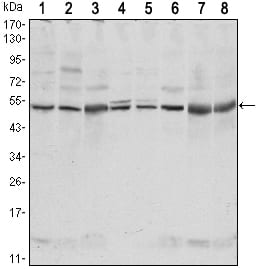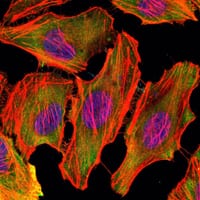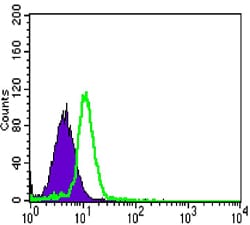


| WB | 1/500 - 1/2000 | Human,Mouse,Monkey,Rat |
| IF | 咨询技术 | Human,Mouse,Monkey,Rat |
| IHC | 咨询技术 | Human,Mouse,Monkey,Rat |
| ICC | 1/200 - 1/1000 | Human,Mouse,Monkey,Rat |
| FCM | 1/200 - 1/400 | Human,Mouse,Monkey,Rat |
| Elisa | 1/10000 | Human,Mouse,Monkey,Rat |
| Aliases | MGC117393; CSK |
| Entrez GeneID | 1445 |
| clone | 5F3 |
| WB Predicted band size | 50kDa |
| Host/Isotype | Mouse IgG1 |
| Antibody Type | Primary antibody |
| Storage | Store at 4°C short term. Aliquot and store at -20°C long term. Avoid freeze/thaw cycles. |
| Species Reactivity | Human,Mouse,Monkey,Rat |
| Immunogen | Purified recombinant fragment of human CSK expressed in E. Coli. |
| Formulation | Purified antibody in PBS with 0.05% sodium azide. |
+ +
以下是3篇与CSK抗体相关的文献概览,涵盖抗体开发、功能研究及应用场景:
---
1. **文献名称**: *"Disruption of the csk gene, encoding a negative regulator of Src family tyrosine kinases, leads to neural tube defects and embryonic lethality in mice"*
**作者**: Imamoto, A., Soriano, P.
**摘要**: 该研究通过基因敲除技术删除小鼠的Csk基因,发现胚胎致死及神经管发育缺陷。研究中利用特异性CSK抗体进行蛋白表达检测和组织定位分析,证实Csk缺失导致Src家族激酶异常激活,揭示了Csk在胚胎发育中的关键调控作用。
---
2. **文献名称**: *"Cloning and characterization of C-terminal Src kinase (CSK) and its downstream substrates"*
**作者**: Okada, M., Nada, S., Yamanashi, Y., et al.
**摘要**: 本研究首次成功克隆了CSK基因,并制备了针对CSK的多克隆抗体。通过抗体进行免疫沉淀和Western blot分析,验证了CSK与Src激酶的相互作用及其在抑制Src活性中的功能,为后续研究提供了关键工具。
---
3. **文献名称**: *"CSK regulates integrin-mediated cytoskeletal reorganization and cell migration"*
**作者**: Nakagawa, T., Tanaka, S., Suzuki, H., et al.
**摘要**: 文章探讨了CSK通过调控Src活性影响细胞迁移的机制。利用CSK抗体进行免疫荧光染色,发现CSK缺失导致细胞骨架蛋白异常分布,并通过抗体阻断实验证明CSK在整合素信号通路中的核心作用,为癌症转移研究提供了新视角。
---
**备注**:以上文献年份集中在1990s至2000s初期,反映了CSK抗体的基础开发及早期功能研究。如需近年应用(如疾病诊断或靶向治疗),建议补充关键词(如“CSK antibody cancer”或“CSK inhibitor”)进一步检索。
**Background of CSK Antibodies**
CSK (C-terminal Src kinase) is a non-receptor tyrosine kinase that regulates the activity of Src family kinases (SFKs), a group of signaling proteins critical for cell proliferation, differentiation, and migration. CSK inhibits SFKs by phosphorylating a conserved C-terminal tyrosine residue, which induces a conformational change to suppress kinase activity. This regulatory mechanism is vital for maintaining cellular homeostasis, as uncontrolled SFK activation is linked to cancer, immune disorders, and inflammatory diseases.
CSK antibodies are immunological tools designed to detect, quantify, or inhibit CSK in experimental settings. They are widely used in techniques like Western blotting, immunohistochemistry, and immunofluorescence to study CSK expression, localization, and interactions in cellular or tissue samples. Additionally, CSK-specific antibodies aid in elucidating its role in signaling pathways, such as T-cell receptor signaling and integrin-mediated adhesion.
Research involving CSK antibodies has provided insights into diseases characterized by dysregulated SFK activity. For instance, reduced CSK expression in certain cancers correlates with increased metastatic potential, highlighting its tumor-suppressive role. CSK-targeting strategies, including therapeutic antibodies, are also explored to modulate SFK-driven pathologies. Both monoclonal and polyclonal CSK antibodies are available, with specificity validated across species, underscoring their versatility in biomedical research.
×